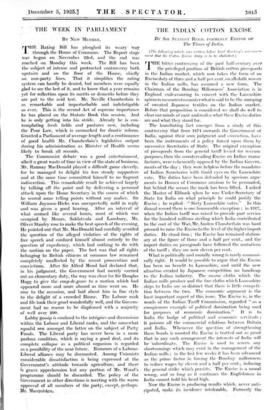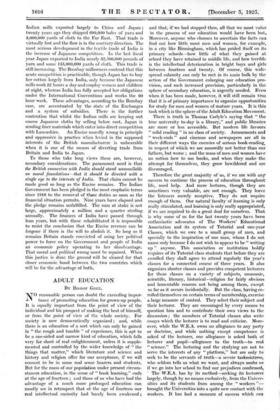THE INDIAN COTTON EXCISE
BY SIR STANLEY REED, FORMERLY EDITOR- OF The Times of India.
The following article wav written before Lonl fleofney's anwnnie.e. meat that the Cotton Excise May is to be abolishedd rrHE bitter controversy of the past half-century over .1 the privileged position of British cotton piecegoods in the Indian market, which now takes the form of an Exciseduty of three and a half per cent. on all cloth woven in the Indian mills, has assumed a new form. The Chairman of the Bombay Millowners' Association is in nglarid endeavouring to concert with the Lancashire spinners measures to counter what is said to be the dumping of sweated Japanese textiles on the Indian market. Before that proposition is considered we shall do well to clear our minds of cant and realize what these Excise duties are and what they stand for.
The humiliating fact emerges from a study of this controversy that from 1874 onwards the Government of India, against their own judgment and conviction, have been the instruments of a policy forced upon them by successive Secretaries of State. The original exemption of piecegoodS from the general tariff levied for revenue purposes, then the countervailing Excise on Indian manu- factures, were vehemently opposed by the Indian Govern. ments of the day ; they were helpless before the mandates of Indian Secretaries with timid. eyes on the Lancashire vote. The duties have been defended by specious argu- ments to Houses of Commons anxious to be persuaded, but behind the scenes the mask has been lifted. I asked the Master of Elibank nhen he was Under-Secretary of State for India on what principle he could justify the Excise ; he replied—" Sixty Lancashire votes." In this dismal record there is one honourable exception ; in 1917, When the Indian tariff was raised to provide part service for the hundred millions sterling which India contributed to the cost of the War, Mr. Austen Chamberlain was. hard pressed to raise the Excise to the level of the higher import duties. He stood firm ; the Excise has remained station- ary at the figure of three and a half per cent., and the import duties on piecegoods have followed the mutations of the tariff ; they are now eleven per cent.
What is politically and morally wrong is rarely economi- cally right. It would be possible to argue that the Excise has been no benefit to Lancashire, and until the new situation created by Japanese competition no handicap to the Indian industry. The coarse cloths which the Indian mills produce and the fine cloths which Lancashire ships to India arc so distinct that there is little competi- tion between the two. The economic argument is the least important aspect of this issue. The Excise is, in the words of the Indian Tariff Commission, regarded' as a conspicuous example of political domination being used for purposes of economic domination." It is to India the badge of political and economic servitude ; it poisons all the commercial relations between Britain and India. Whenever the question of strengthening these bonds is mooted the Excise is trotted out as proof that in any such arrangement the interests of India will be 'subordinate. The Excise is used to screen any shortcomings which may exist in the management of the Indian mills ; in the last few weeks it has been advanced as the prime factor in forcing the Bombay millowners to reduce wages by eleven and'a half per cent; inducing the general strike which persists. The Excise is a moral wrong, and so long as it continues the Englishman in India cannot hold his head high.
Now the Excise is producing results which, never- anti- cipated, make its incidence intolerable, Formerly -the Indian mills exported -largely - to China and Japan twenty years ago they shipped 600,000 bales of yarn and 8,000,000 yards of cloth to the Far East. _ That trade is virtually lost and the flow is in the contrary direction. The most serious development in the textile trade of India is the increase of Japanese competition. In the last fiscal year Japan exported to India nearly 32,500,000 pounds of yarn and some 155,000,000 yards of cloth. This trade is still increasing. The Bombay millowners contend that this acute competition is practicable, though Japan has to buy her cotton largely from India, only because the Japanese mills work 22 hours a day and employ woinen and children at night, whereas India has fully accepted her obligations under the International Conventions and works the 60 hour week. These advantages, according to the Bombay case, are accentuated by the state of the Exchanges and a system of subsidies. There is the further contention that whilst the Indian mills are keeping out coarse Japanese cloths by selling below cost, Japan is sending finer materials which enter into direct competition with Lancashire. An Excise morally wrong in principle and oppressive in practice when levied in the supposed interests of the British manufacturere is unbearable when it is one of the means of diverting trade from Britain and India to Japan.
To those who take long views these are, however, secondary considerations. The paramount need is that the British connexion with India should stand unassailable on moral foundations—that it should be directed with a single eye to the interests of India. That claim cannot be made good so long as the Excise remains. The Indian Government has been pledged in the most emphatic terms since 1916 to the removal of these duties as soon as the financial situation permits. Nine years have elapsed and the pledge remains unfulfilled. The sum at stake is not large, approximately a million and a quarter sterling annually. The finances of India have passed through lean years, but with these rehabilitated it is impossible to resist the conclusion that the Excise revenue can be forgone if there is the will to abolish it. So long as it remains Britain stands convicted of using her political power to force on the Government and people of India an economic policy operating to her disadvantage. That moral and political wrong must be repaired. When this justice is done the ground will be cleared for that closer economic bond between the two countries which will be for the advantage of both.



































































 Previous page
Previous page